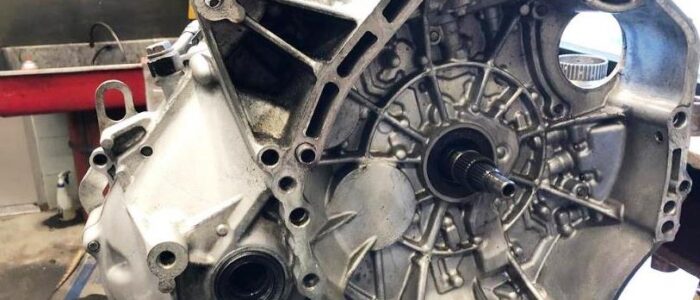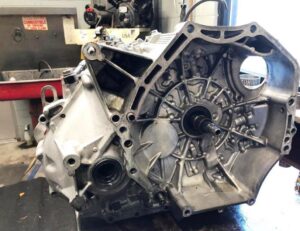
 If you are experiencing transmission problems with your vehicle, you may be wondering whether it’s better to rebuild or replace your transmission. In this blog post, we’ll explore the differences between transmission rebuild and replacement, and help you decide which option is the right choice for your vehicle. Searching for a transmission shop that you can count on, trust & afford?
If you are experiencing transmission problems with your vehicle, you may be wondering whether it’s better to rebuild or replace your transmission. In this blog post, we’ll explore the differences between transmission rebuild and replacement, and help you decide which option is the right choice for your vehicle. Searching for a transmission shop that you can count on, trust & afford?
Should You Rebuild or Replace Your Transmission?
When it comes to your vehicle’s transmission, the decision to either rebuild or replace it often boils down to the cost and time involved in completing the repair. Opting for a transmission rebuild by a skilled professional may take a little more time and require a slightly higher upfront / down payment cost, but the end result can be a transmission that lasts longer and performs better than a replaced one, depending on the replacement path you choose.
What is a Transmission Rebuild?
A transmission rebuild involves disassembling your transmission, cleaning its parts, and replacing any worn or damaged components. This process is done to restore your transmission to its original condition, and it’s often a cost-effective alternative to a full transmission replacement.
When is a Transmission Rebuild Necessary?
A transmission rebuild is typically necessary when your transmission has minor to moderate damage or wear and tear. Signs that your transmission may need a rebuild include slipping gears, delayed shifting, or unusual noises while driving. Do you need a transmission rebuild service and or are you currently seeking a repair shop that will rebuild your transmission? Call our team of expert transmission rebuilders at 815-577-0327 now!
What is a Transmission Replacement?
A transmission replacement involves completely removing your old transmission and installing a new or rebuilt assembly. This is typically necessary when your transmission has major damage or has reached the end of its lifespan aka point of no return. Do you need a transmission replaced? You are in luck we replace transmissions practically on a daily basis and know transmissions like the backs of our hands.
When is a Transmission Replacement Necessary?
A transmission replacement is typically necessary when your transmission has extensive damage, such as broken gears or a cracked case, or has reached the end of its expected lifespan. Signs that your transmission may need replacement include slipping gears that cannot be fixed with a rebuild, frequent breakdowns, or a transmission fluid leak.
Which is the Right Choice for Your Vehicle?
Deciding whether to rebuild or replace your transmission depends on several factors, including the age and condition of your vehicle, the severity of your transmission problems, and your budget at hand. In general, a transmission rebuild is a more cost-effective option in the long run, but a replacement may be necessary if your transmission has extensive damage or is nearing the end of its lifespan. Looking for a transmission shop near me that you can trust & afford?
Contact Us for Transmission Service in Plainfield, Naperville, Bolingbrook, Romeoville, IL, Greater Chicago Area
At Last Chance Auto Repair in Plainfield, IL, we offer expert transmission repair, rebuild, and replacement services in Plainfield, Naperville, and Bolingbrook, IL. Our experienced technicians can diagnose your transmission problems and recommend the best course of action for your vehicle. Contact our transmission experts today to schedule an appointment and get your transmission running smoothly again.
Trouble Signs in Your Transmission: Recognizing
Red Flags for Timely Action
If you’ve noticed your vehicle behaving differently, making odd sounds, or experiencing delays in shifting, it might be signaling trouble in the transmission. In this guide, we’ll help you decode these signs, empowering you to recognize potential issues before they become major headaches.
Strange Noises:
One of the primary indicators of transmission problems is strange noises. Listen closely for:
Whining or Humming Sounds:
A high-pitched whine or hum, while your vehicle is in motion, might indicate low transmission fluid or worn-out bearings. In addition, addressing this early can prevent more significant issues down the road.
Clunking or Grinding:
If you hear abrupt clunking or grinding noises, especially when shifting gears, it could be a sign of damaged gear or other internal components.
2. Slipping Gears:
Transmission gears should engage smoothly. If you experience any of the following, your transmission may be slipping:
Unexpected RPM Increase:
A sudden spike in engine RPM without a corresponding increase in vehicle speed could mean the transmission is slipping. This often feels like a momentary loss of power.
Difficulty Maintaining Speed:
If your vehicle struggles to stay at a constant speed or unexpectedly slows down, it may be slipping out of gear.
3. Delays in Shifting:
Smooth gear transitions are crucial for a well-functioning transmission. Watch out for signs of delayed shifting:
Hesitation or Lag:
A noticeable delay when shifting gears, whether from park to drive or between driving gears, could indicate issues with the transmission’s hydraulic system or other components.
Jerking or Shuddering:
Feeling a noticeable jerk or shudder during gear changes might signal transmission troubles. Moreover, this could be caused by worn-out components or inadequate fluid levels.
Weighing the Costs: Understanding the Money Side of
Fixing Your Transmission
Let’s discuss the cost when you’re considering fixing the transmission and your car is acting a bit wonky. We want to break down the costs and figure out if it’s a good deal for the long haul.
First Things First – Starting Cost:
So, when you decide to fix your transmission, there’s a starting cost. This covers the work done by the folks fixing your car, the new parts they put in, and everything else needed to get your transmission back on track. Keep in mind that the starting cost can vary depending on the level of trouble your transmission is causing and the type of fix you’re opting for.
The Scoop on a Transmission Rebuild:
Now, if you’re thinking about a transmission rebuild, here’s the lowdown: it means taking the transmission apart, giving it a good cleaning, and putting in new parts where needed. This method might take a bit more time and cost a bit more at the beginning. But here’s the cool part – a well-done rebuild can make your transmission last longer and work better than just slapping in a new one.
Looking Ahead – Long-Term Benefits:
When you’re thinking about the money side of fixing your transmission, it’s not just about what you pay upfront. You’ve got to think about the good stuff that happens later. With a transmission rebuild, it’s like giving your car a fresh start. You’re not just fixing what’s broken; you’re setting up your car for a smoother ride in the long run.
The Downside of Waiting:
Now, if you put off fixing your transmission because you’re worried about the cost, it could lead to more problems. Ignoring those early signs of trouble can create bigger issues, and you might end up needing a more expensive fix or even a whole new transmission.
Making a Smart Move:
To make a smart move, think about what you’re paying now versus what you get later. Consider how old your car is and how it’s doing overall. Even though a transmission rebuild might seem a bit pricey upfront, it’s like investing in your car’s future. It could save you money down the road by making sure your car runs better for a longer time.
The Bottom Line:
When it comes to fixing your transmission, understanding the money stuff is key. Whether you go for a rebuild or something else, think about the good things that can come from keeping your transmission in top shape. Don’t forget to take care of your car with regular check-ups and fixes when needed. And hey, if you’re around Plainfield, IL, our team at Last Chance Auto Repair is here to help you figure out the best way to keep your transmission cruising smoothly.
Frequently Asked Questions (FAQs)
1. How do I know if my car’s transmission needs help?
Keep an ear out for weird noises, like clunks or whining. Also, watch for issues like gears slipping or delays in shifting. If your car acts odd, it’s time to get the transmission checked.
2. What’s the difference between fixing and replacing a transmission?
Fixing, or rebuilding, means taking it apart, cleaning, and replacing worn parts. Replacing means swapping out the old transmission for a new or rebuilt one.
3. When do I need a transmission rebuild?
If your transmission has small to medium issues like slipping gears, delayed shifting, or strange noises, a rebuild might be the fix.
4. When do I need a transmission replacement?
Go for a replacement if your transmission has big problems like broken gears or it’s just old and tired. Signs include gears slipping with no fix, lots of breakdowns, or leaking fluid.
5. Is a rebuild cheaper in the long run?
Yup, even though it might cost a bit more upfront, a rebuild can save money over time. You get a transmission that lasts longer and works better than a new one.
6. What should I think about when choosing to fix or replace my transmission?
Consider your car’s age, how bad the transmission problems are, and your budget. Typically, transmission rebuild costs less, but you might need to consider replacement if your transmission is severely damaged.
7. How do I know if my transmission is acting up?
Listen for odd noises like whining or clunking. Also, be on the lookout for gears slipping, RPM going up for no reason, trouble keeping a steady speed, or delays and jerks when shifting.
Conclusion
In summary, whether transmission rebuild or replace it depends on several factors, including the age and condition of your vehicle, the severity of your transmission problems, and your budget. At local transmission shop Last Chance Auto Repair, we offer expert transmission services and can help you determine which option is the right choice for you and your vehicle. Contact us today to schedule an appointment, to get your transmission rebuild purring like a kitten again and or if you have any transmission service related questions. We have you covered!
